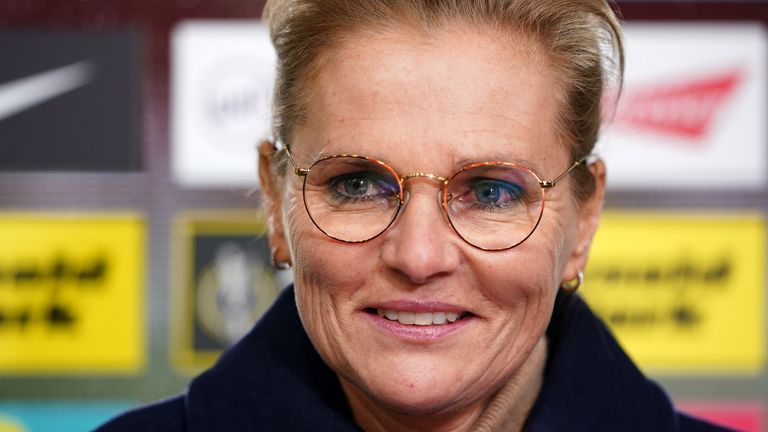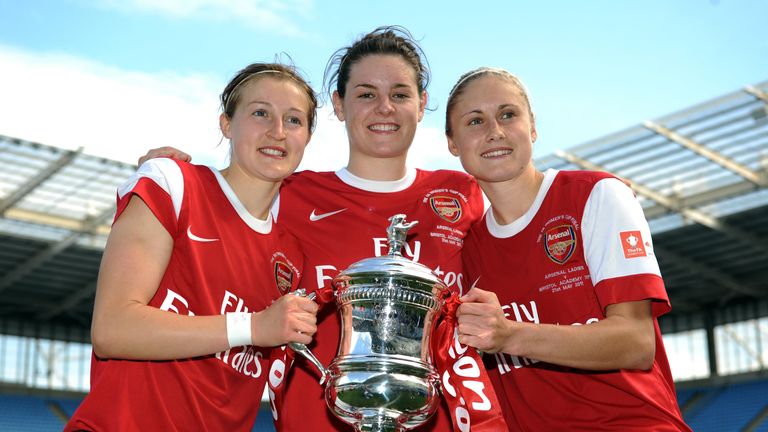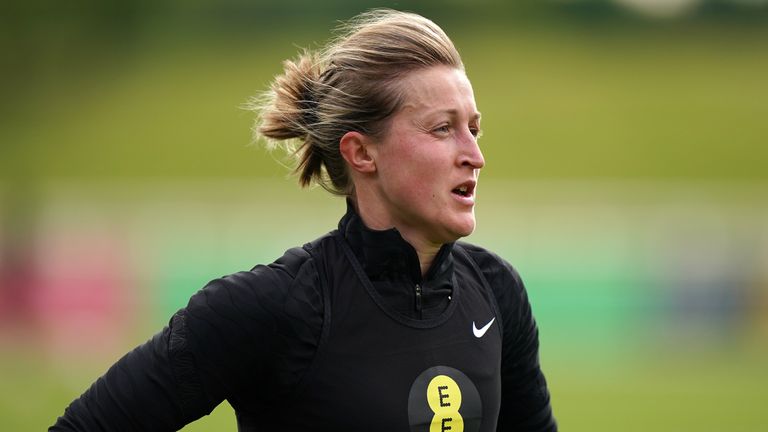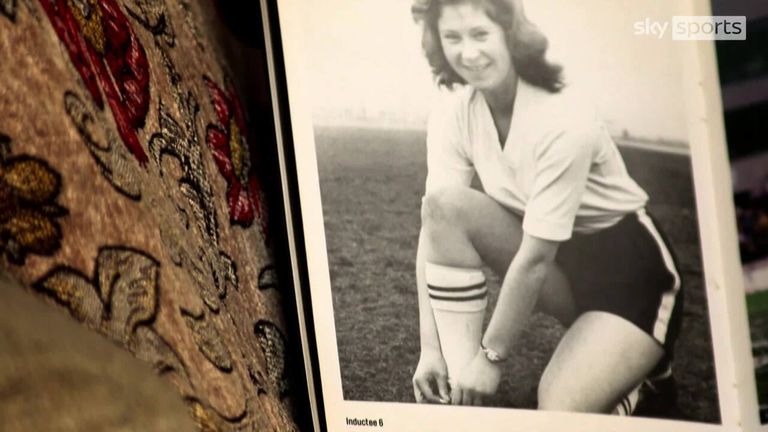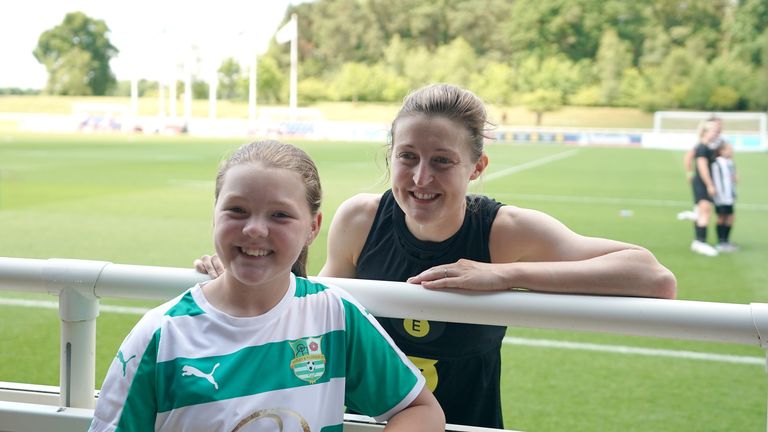As the Women’s Euros draws nearer, the Lionesses are looking to make an international impact on their own turf. But before that, one of England Women’s iconic players, Ellen White, met up with Sky Sports’ Sue Smith at her old stomping ground, William Harding Primary School, in Aylesbury.
Before she became England Women’s record goal-scorer – which she achieved on her 101st cap against Latvia earlier this season – the Manchester City star was ready to break boundaries and social stereotypes to be the player she is today.
In an era where there were no women’s football teams or leagues to nurture the aspiration of any young female, White was introduced to football by her father, Jon, who ran a soccer academy called ‘Mini Ducks.’
It helped her gain the passion and confidence to join her primary school team and then move on to Aylesbury United’s men’s team – despite being the only girl. It was rumoured she scored over 100 goals before being scouted by Arsenal at the age of eight.
”I started playing football in the garden with my dad, brother and sisters,” White told Sky Sports’ Sue Smith, who won 93 caps for England. ”There wasn’t really any kind of football centres growing up, so that’s when my dad set up Mini Ducks.
”My brother was a big influence in terms of being out in the garden playing football. He was older than me but still enjoyed playing and I used to go and watch him.
”Being the baby of the family, I’d take it everywhere, so I got a lot of my traits from them; working hard, playing football and enjoying it.”
‘I was told I would never play for England’
As White started her career she was faced with criticism along the way. Even with the support of her team-mates and family, not many were used to the idea of a female star in football.
”When I was a little bit younger and in the boys’ team, I remember a lot of the parents would be like, ‘Is that a girl on the team? What’s happening?’ White stated.
”When you get a bit older in our skill set, the pressure of winning and wanting to do well makes coaches not pick you and I think it comes with the nature of the sport.”
But while negative comments and a few games on the bench were no match for White’s love of the game, at the age of 16, the aspiring England hopeful was dealt a devastating blow.
”I was hoping to go to Loughborough Academy when I was 16, ” White said. ”That’s when I was told I would never play for England because I wasn’t good enough. I didn’t know what to do.
”That’s when I changed schools. I went to a completely different sixth form, changed clubs from Arsenal to Chelsea and I completely went out of my comfort zone. I just tried something different – which I think helped me!”
Building a legacy for club and country
It seemed to do the trick for White. After joining Chelsea in 2005, White scored 21 goals in 48 appearances, which made her the top scorer for Chelsea in her three seasons there.
Her move to Leeds Carnegie in 2008 was hampered by a ligament injury, but she returned towards the end of the 2008/09 season, scoring five goals in four games.
After that, White didn’t look back, and in the following season she helped Leeds win the FA Women’s Premier League Cup, scoring twice against Everton in a 3-1 victory in the final.
It was in February 2010 when a 20-year-old White made her England debut – four years after she was told she would never play for her country. She scored in a 3-1 victory against Austria after coming on as a substitute.
While White began what would become a record-breaking international career, she returned to Arsenal in 2010. Not only did she score six goals in 13 appearances in her first season, but she eventually helped the Gunners to the FA Cup, League Cup and Women’s Super League trophies. During her time under manager Laura Harvey, she went on to win another title and FA Cup.
White has gone on to carve her name in the England Women’s hall of fame, and even marked her World Cup debut in 2011 with a superb 22-yard strike against Japan.
She continued to enjoy success with England, and picked up the Cyprus (2013), SheBelieves (2019) and Arnold Clark Cups (2022) as the years went by.
Yet all those achievements paled in comparison to her performance in the 2019 World Cup, where she was pivotal in England’s run to the semi-finals. White scored six goals in the tournament, making her the joint-top scorer.
But looking back on her stellar career, White admits she never thought she would play for England, saying: “I never thought I was good enough. I was selected for the youth age groups, but I had never thought I’d become a senior international.
”I think when it did happen, it just blew my mind.”
‘I still feel weird when you call me a role model’
White’s performances for club and country have helped Leeds, Arsenal, Manchester City and England to glory, and in doing so, have surely helped to inspire other women to pursue a career in football.
After 17 years of racking up the goals and trophies, White may not be finished yet, with expectations for Sarina Wiegman’s England squad high ahead of the home Euros this summer.
England’s group-stage games have already sold out – further evidence of the growing support for women’s football – and White said: “I still feel weird when you call me a role model. I feel like it is a massive responsibility and a privilege at the same time that people kind of look up to me.
“It’s so exciting that the Euros are in England and all our group games have sold out. Hopefully it will be easy for fans to watch a game. There’s some incredible talent on show and I hope there will be another massive surge in people who want to get involved in football. I really hope everyone jumps on board with that.”
When England begin their Euros campaign on July 6 against Austria at Old Trafford, it would be no surprise to see White further her legacy once again.
Follow Euro 2022 across Sky Sports
Keep up with all the latest from Euro 2022 across Sky Sports and Sky Sports News this summer.
Coverage will be anchored by Sky Sports WSL presenter Caroline Barker, alongside Jessica Creighton and Kyle Walker. Meanwhile, Karen Carney, Sue Smith, Courtney Sweetman-Kirk and Laura Bassett will give analysis throughout the tournament.
They will also be joined by experienced England goalkeeper Karen Bardsley and Manchester City defender Esme Morgan.
The pundits and presenters will work from the Sky Sports Women’s Euro 2022 Mobile Presentation Bus, which will follow the Sky Sports News team around the country to the various stadiums where matches are being played.
In addition, Sky Sports’ Essential Football Podcast will be rebranded for the tournament to Sky Sports Women’s Euros Podcast from 21 June. Hosted by Charlotte Marsh and Anton Toloui, it will feature exclusive news and player interviews in addition to a strong programme line up around the tournament.
Euro 2022: The groups…
Group A: England, Austria, Norway, Northern Ireland
Group B: Germany, Denmark, Spain, Finland
Group C: Netherlands, Sweden, Portugal, Switzerland
Group D: France, Italy, Belgium, Iceland
Euro 2022: The schedule…
Group stage
Wednesday July 6
Group A: England vs Austria – kick off 8pm, Old Trafford
Thursday July 7
Group A: Norway vs Northern Ireland – kick off 8pm, St Mary’s
Friday July 8
Group B: Spain vs Finland – kick off 5pm, Stadium MK
Group B: Germany vs Denmark – kick off 8pm, London Community Stadium
Saturday July 9
Group C: Portugal vs Switzerland – kick off 5pm, Leigh Sports Village
Group C: Netherlands vs Sweden – kick off 8pm, Bramall Lane
Sunday July 10
Group D: Belgium vs Iceland – kick off 5pm, Manchester City Academy Stadium
Group D: France vs Italy – kick off 8pm, New York Stadium
Monday July 11
Group A: Austria vs Northern Ireland – kick off 5pm, St Mary’s
Group A: England v Norway – kick off 8pm, Brighton and Hove Community Stadium
Tuesday July 12
Group B: Denmark vs Finland – kick off 5pm, Stadium MK
Group B: Germany vs Spain – kick off 8pm, London Community Stadium
Wednesday July 13
Group C: Sweden vs Switzerland – kick off 5pm, Bramall Lane
Group C: Netherlands v Portugal – kick off 8pm, Leigh Sports Village
Thursday July 14
Group D: Italy vs Iceland – kick off 5pm, Manchester City Academy Stadium
Group D: France vs Belgium – kick off 8pm, New York Stadium
Friday July 15
Group A: Northern Ireland v England – kick off 8pm, St Mary’s
Group A: Austria vs Norway – kick off 8pm, Brighton and Hove Community Stadium
Saturday July 16
Group B: Finland vs Germany – kick off 8pm, Stadium MK
Group B: Denmark vs Spain – kick off 8pm, London Community Stadium
Sunday July 17
Group C: Switzerland vs Netherlands – kick off 5pm, Bramall Lane
Group C: Sweden vs Portugal – kick off 5pm, Leigh Sports Village
Monday July 18
Group D: Iceland vs France – kick off 8pm, New York Stadium
Group D: Italy vs Belgium – kick off 8pm, Manchester City Academy Stadium
Knockout phase
Quarter-finals
Wednesday July 20
Quarter-final 1: Winners Group A v Runners-up Group B – kick off 8pm, Brighton and Hove Community Stadium
Thursday July 21
Quarter-final 2: Winners Group B v Runners-up Group A – kick off 8pm, London Community Stadium
Friday July 22
Quarter-final 3: Winners Group C v Runners-up Group D – kick off 8pm, Leigh Sports Village
Quarter-final 4: Winners Group D v Runners-up Group C – kick off 8pm, New York Stadium
Semi-finals
Tuesday July 26
Semi-final 1: Winners quarter-final 1 v Winners quarter-final 3 – kick off 8pm, Bramall Lane
Wednesday July 27
Semi-final 2: Winners quarter-final 2 v Winners quarter-final 4 – kick-off 8pm, Stadium MK
Final
Sunday July 31
Winners semi-final 1 v Winners semi-final 2 – kick off 5pm, Wembley





